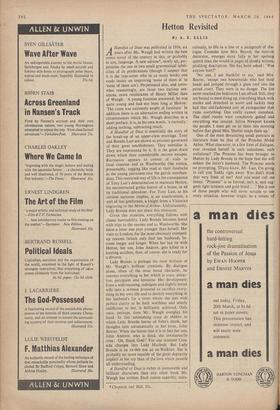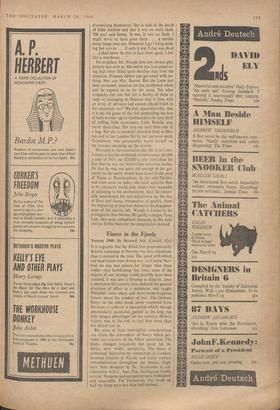Hetton Revisited
By A. E. ELLIS
AHandful of Dust was published in 1934, six years after Mr. Waugh had written the best comic novel of the century in this, or probably in any, language. A new edition*, newly set, per- petuates the one or two small grammatical infeli- cities of its predecessors (though I suspect that it is the type-setter who in so many books one reads insists on improving 'none of them is' to 'none of them are'). Perpetuated also, and some- what reassuringly, are those two curious sen- tences, more reminiscent of Henry Miller than of Waugh: 'A young footman answered; he was quite young and had not been long at Hetton.' 'The room was extremely empty of furniture.' In addition there is an alternative ending written in circumstances which Mr. Waugh describes in a short preface. It is, in his own words, 'a curiosity,' adding nothing, subtracting much. A Handful of Dust is essentially the story of the break-up of an upper-class marriage. Tony and Brenda Last are shown as prisoner-governors of their great establishment. They subsidise it. They are imprisoned by it. It is the great drain down which their considerable income escapes. Recreation appears to consist of visits to local cinemas and to Woolworths (the rustics, presumably, tugging like mad at their forelocks as the young patricians tour the garish merchan- dise). This restricted way of life is the consequence of Tony Last's determination to maintain Hetton, his reconstructed gothic horror of a house, in all its traditional splendour. For Tony Last, as his curious surname implies, is an anachronism, a sort of last gentleman, a knight from a Victorian engraving to the Morte d'Arthur. Unfortunately, Lady Brenda does not share this obsession.
Given this situation, everything follows with classic inevitability. Lady Brenda becomes bored with trips to the movies and to Woolworths. She takes a lover one year younger than herself. Her visits to London, for 'the most obviously trumped- up reasons (which only fool her husband), be- come longer and longer. When her last tie with Hetton, her son, John Andrew, gets killed in a hunting accident, then, of course, she is ready for a divorce. ,
Lady Brenda is perhaps the most brilliant of Mr. Waugh's brilliant creations. By dialogue alone, often of the most banal character, he conveys everything in her which is crass, attrac- tive, percipient and feminine. Her development from a well-meaning, indulgent and slightly bored wife into a woman prepared to sacrifice every- thing in her own life and 'to destroy everything in her husband's for a lover whom she sees with perfect clarity to be both worthless and utterly indifferent to her, is brilliantly achieved. Only once, perhaps, does Mr. Waugh overplay his hand. In that astonishing coup de theatre in which Lady Brenda learns of John's death, her thoughts turn automatically to her lover, John Beaver. When she learns that it is in fact her son, John Andrew, who is dead, she involuntarily cries: 'Oh, thank God!' For one moment Cres- sida changes into Lady Macbeth. But Lady Brenda is an ex-deb not an ex-Walkilre. She is probably no more capable of the great depravity implicit in her cry than of the love which passeth all understanding.
A Handful of Dust is richer in memorable and brilliant characters than any other book Mr. Waugh has written. Each comes superbly, mira-
* Chapman and Hall, 21s.
culously, to life in a line or a paragraph of dia- logue. Consider how Mrs. Beaver, the interior decorator, emerges more fully in her opening speech than she would in pages of closely written, plodding description. She has .been asked : 'Was anyone hurt?'
'No one, I am thankful to say,' said Mrs. Beaver, 'except two housemaids who lost their heads and jumped through a glass roof into the paved court. They were in no danger. The fire never reached the bedrooms I am afraid. Still, they are bound to need doing up, everything black with smoke and drenched in water and luckily they had that old-fashioned sort of extinguisher that ruins everything. One really cannot complain. The chief rooms were completely gutted and everything was insured. Sylvia Newport knows the people. I must get on to them this morning before that ghoul Mrs. Shutter snaps them up.'
One of the most devastating small portraits in literature must be that of the Princess Abdul Akbar. What character, in a few lines of dialogue, ever revealed herself in such nakedness, such awfulness? The Princess has been brought to Hetton by Lady Brenda in the hope that she will seduce the latter's husband. The Princess needs no prompting. 'D'you know, Mr. Last, I'm going to call you Teddy right away. You don't think that very fresh of me? And you must call me Jenny. "Princess" is so formal, isn't it, and sug- gests tight trousers and gold braid . . .' She is one of those people who will never scruple to use every situation, however tragic, as a means of
dramatising themselves. She is told of the death of John Andrew and that it was no one's fault. 'Oh yes,' said Jenny. 'It was. It was my fault. I ought never to have gone there . . . a terrible curse hangs over me. Wherever I go I bring noth- ing but sorrow ... if only it was I that was dead ... I shall never be able to face them again. I feel like a murderess .
Nevertheless Mr. Waugh does not always play entirely fair with us. His satiric eye is so penetrat- ing that when blind spots develop they rivet the attention. Princess Akbar can get away with no- thing. Nor can Mrs. Beaver. But the Lasts and their economic situation he has swallowed whole and he expects us to do the same. Yet what sympathy can one feel for a family of three so inept at managing its finances that it lives with an army of servants And cannot afford lunch in the restaurant car? We feel, uncomfortably, that it is the old game of the rich demanding the best of both worlds—great opulence plus the cosy thrill of trifling little economies. Lady Brenda may travel third-class. She may eat iced buns out of a bag. But she is naturally attended both at Het- ton and in her London flat by her personal maid, Grimshawe, who presumably busies herself on the journey sweeping up the crumbs.
We come to the conclusion that Mr. l.ast's mis- fortune is less his straitened circumstances (1:6,000 a year in 1934, say £20,000 a year now) than the fact that he was not born a few centuries earlier. Or that he was not quite old enough to die gal- lantly (as he surely would have clone) in the mud of Ypres or Passchetidaele. In the mid-Thirties, and even more so today, the fatal, quixotic flaw in his character could only render him incapable of adjusting to his environment. And the inexor- able punishment for non-adjustment (as the loss of flora and fauna, irrespective of quality, from the beginning of time has shown) is the disappear- ance of the species. Mr. Waugh is kinder to his protagonist than Nature. He gently consigns Tony Last, like some unbaptised innocent, to the most curious limbo that ever the imagination devised.









































 Previous page
Previous page